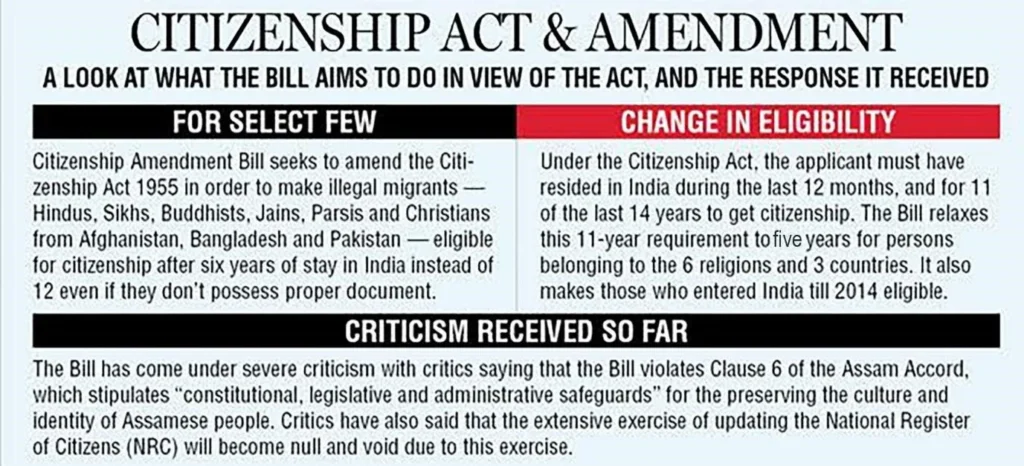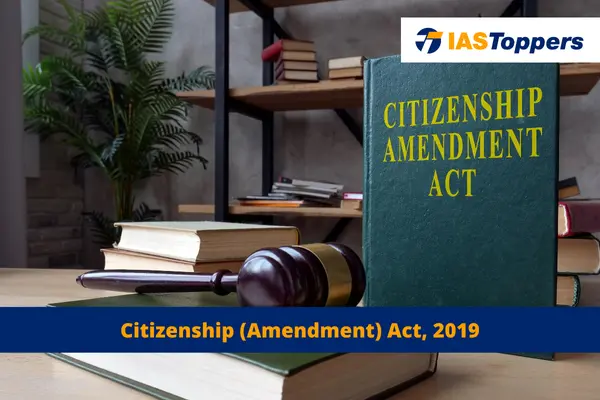The Citizenship Amendment Act (CAA) of 2019, passed by the Indian Parliament, brought modifications to the Citizenship Act of 1955. It is aimed to create a smoother path to Indian citizenship for religious minorities facing persecution in certain neighboring countries, including Hindus, Sikhs, Buddhists, Jains, Parsis, and Christians who migrated to India before December 2014. Notably, this amendment differed from previous citizenship laws by excluding a specific group. The Citizenship Act of 1955 regulates the process of acquiring Indian citizenship through various methods, including restrictions on unauthorized migrants and exemptions for specific communities from certain countries who arrived before a specified date.
Citizenship Amendment Act 2019 will be helpful for UPSC IAS Exam preparation. GS Paper-2 Indian Polity.
Table of content
- What is Citizenship Amendment Act (CAA) 2019?
- Citizenship in India
- Citizenship Amendment Act 2019: Criteria for Determining Citizenship
- Citizenship Amendment Act 2019: Impact on Northeast India
- Citizenship Amendment Act 2019 on OCI Registration
- Criticism of Citizenship Amendment Act 2019
- Conclusion
- Frequently Asked Questions (FAQs)
What is Citizenship Amendment Act (CAA) 2019?
The Parliament of India passed the CAA on 11 December 2019. It brought amendments to the existing Citizenship Act, 1955.

Objective of the CAA:
- The CAA aimed to provide an expedited path to Indian citizenship for religious minorities facing persecution.
- Specifically, it focused on individuals from Afghanistan, Bangladesh, and Pakistan.
- Eligibility was granted to Hindus, Sikhs, Buddhists, Jains, Parsis, and Christians from these countries.
- The condition was that they must have arrived in India before December 2014.
Exclusion of Muslims:
- The CAA did not extend this eligibility to Muslims from Afghanistan, Bangladesh, and Pakistan.
- This differentiation based on religion was a significant departure from previous Indian citizenship laws.
Citizenship in India
Methods of Acquiring Citizenship:
- Citizenship in India can be acquired through various methods regulated by the Citizenship Act, 1955.
- The five methods include birth in India, descent, registration, naturalisation (extended residence), and incorporation of territory.
Restrictions on Illegal Migrants:
- Illegal migrants are not allowed to acquire Indian citizenship.
- Illegal migrants: They are foreigners who enter India without valid travel documents or overstay their permitted time.
- They can face prosecution, deportation, or imprisonment.
Exemptions for Certain Groups:
- These exemptions apply to migrants from Afghanistan, Bangladesh, or Pakistan who arrived before December 31, 2014.
- The exemptions are limited to individuals belonging to the Hindu, Sikh, Buddhist, Jain, Parsi, or Christian communities.
Citizenship Amendment Act 2019: Criteria for Determining Citizenship
- The Act introduces changes to the criteria for determining citizenship.
- Certain classes of illegal migrants from three countries will be eligible for citizenship.
- On acquiring citizenship, they will be considered Indian citizens from their date of entry, and relevant legal proceedings will be closed.
Citizenship by Naturalisation:
- The Act allows individuals to apply for citizenship by naturalisation based on specific qualifications.
- One requirement is a minimum residency of 11 years out of the preceding 14 years.
- The specified class of illegal migrants will have the residency requirement reduced to five years.
Citizenship Amendment Act 2019: Impact on Northeast India
Conflicts with the Northeast Government:
- The enactment of the CAA 2019 created tensions between the central government and the governments of Northeast states.
- The Act contradicted the provisions of the Assam accord of 1955, which emphasized the punishment and deportation of illegal immigrants.
Population Concerns:
- Northeast India has expressed concerns about the impact of illegal immigrants on its population dynamics.
- The influx of illegal immigrants has disrupted the demographic balance and raised worries about resource availability for the indigenous population.
Economic Consequences:
- The CAA 2019 has implications for the economy of Northeast states.
- The surge in population due to illegal immigration leads to increased land and job demands, which can strain the economic resources available to the indigenous people.
Citizenship Amendment Act 2019 on OCI Registration
OCI Registration:
- The Act introduces changes to the Overseas Citizens of India (OCI) registration provisions.
- OCIs are foreigners of Indian origin, including former Indian citizens and children of current Indian citizens.
- OCIs enjoy privileges like visa-free travel, work, and study in India.
Cancellation of OCI Registration:
- The Act adds a new ground for cancellation: violation of any notified law by the central government.
- However, the Bill lacks guidance on the nature of these laws, raising concerns about potential arbitrariness.
Limits on Government Powers:
- The Supreme Court emphasizes the need for guidance to prevent exceeding permissible limits and arbitrary exercise of powers.
- The Bill’s provisions may grant the government powers beyond valid delegation limits.
Criticism of Citizenship Amendment Act 2019
Article 14 Violation: Differentiating based on religion
- The Act raises concerns about violating Article 14, which guarantees equality to all persons.
- Critics argue that the Act’s differential treatment based on country of origin, religion, entry date, and residence contradict this right.
Discrimination against Muslims:
- The Act faces criticism for discriminating against Muslims.
- Afghanistan’s inclusion without clear justification and exclusion of migrants from other neighbouring countries are questioned.
Unclear Inclusions and Exclusions:
- The Act’s selective inclusion of religious minorities lacks clarity.
- The differentiation based on entry dates into India lacks a clear rationale.
- Exclusion of illegal migrants in certain areas lacks explanation.
Wide Discretion in Canceling OCI Registration:
- Concerns arise from granting the central government extensive power to cancel OCI registration.
- Lack of guidance on the laws subject to cancellation raises questions about excessive delegation of powers.
Conclusion
The evaluation of the Citizenship Amendment Act 2019 demands careful consideration due to its intricate criteria, diverse citizenship determinations, conflicting effects on Northeast India, modifications in OCI registration, critique of religious discrimination, and apprehensions about government authority and excessive delegation.
Ref: Source-1
FAQs (Frequently Asked Questions)
How many times has the citizenship act been amended?
The citizenship act has been amended five times: 1986, 1992,2003, 2005, and 2015.
What is the purpose of the Citizenship (Amendment) Act, 2019?
The purpose of CAA 2019 is to fast-track citizenship for religious minorities, specifically, Jains, Hindus, Sikhs, Buddhists Parsis and Christians, from Afghanistan, Bangladesh and Pakistan who entered India before 2015.


